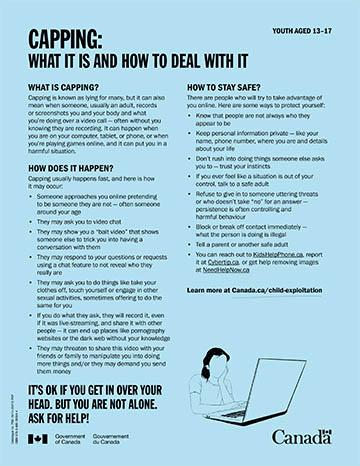Fact Sheet - For youth aged 13-17 - Capping
Youth aged 13–17
Capping: What it is and how to deal with it
What is Capping?
Capping is known as lying for many, but it can also mean when someone, usually an adult, records or screenshots you and your body and what you’re doing over a video call — often without you knowing they are recording. It can happen when you are on your computer, tablet, or phone, or when you’re playing games online, and it can put you in a harmful situation.
How does it happen?
Capping usually happens fast, and here is how it may occur:
- Someone approaches you online pretending to be someone they are not — often someone around your age
- They may ask you to video chat
- They may show you a “bait video” that shows someone else to trick you into having a conversation with them
- They may respond to your questions or requests using a chat feature to not reveal who they really are
- They may ask you to do things like take your clothes off, touch yourself or engage in other sexual activities, sometimes offering to do the same for you
- If you do what they ask, they will record it, even if it was live-streaming, and share it with other people — it can end up places like pornography websites or the dark web without your knowledge
- They may threaten to share this video with your friends or family to manipulate you into doing more things and/or they may demand you send them money
How to stay safe?
There are people who will try to take advantage of you online. Here are some ways to protect yourself:
- Know that people are not always who they appear to be
- Keep personal information private — like your name, phone number, where you are and details about your life
- Don’t rush into doing things someone else asks you to — trust your instincts
- If you ever feel like a situation is out of your control, talk to a safe adult
- Refuse to give in to someone uttering threats or who doesn’t take “no” for an answer — persistence is often controlling and harmful behaviour
- Block or break off contact immediately — what the person is doing is illegal
- Tell a parent or another safe adult
- You can reach out to KidsHelpPhone.ca, report it at Cybertip.ca, or get help removing images at NeedHelpNow.ca
It’s OK if you get in over your head. But you are not alone. Ask for help!
Learn more at Canada.ca/childexploitation
